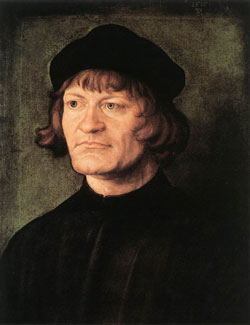
Ulrich Zwingli
Ulrich Zwingli was one of the most instrumental magisterial Reformers of his day, being sometimes referred to as the great unknown of the Reformation. Swiss by birth, he quickly proved to possess a brilliant mind. He pursued learning with vigor and passion. He studied at some of the best institutions Europe had to offer. He was a humanist scholar by educational training, even being personally acquainted with Desiderius Erasmus, visiting him while he was in Basel. It was in Basel that Erasmus published the first Greek New Testament on the printing press. Zwingli was there and left with one of the first personal copies. He was so devoted to reading the Scripture in the original languages that he memorized all of the Apostle Paul's letters in Greek. He also made a personal copy by hand of most of the New Testament in Greek. He also became quite capable in Hebrew, a rare achievement in his day. It was his reading of Scripture that effected Reformation change in the churches he ministered to; first Einsiedeln and then Zurich. At Zurich, he would be the first Reformer to reject the Roman Catholic liturgy and preach the New Testament from the original, verse-by-verse, starting at Matthew. He soon fell under tremendous opposition. He self-published a document entitled Sixty-Seven Articles or Conclusions, in preparation for an official disputation with the Roman Catholic Church in Zurich. This document proved to be the earliest doctrinal creed of the Reformation. His debated could not contend with the document or Zwingli's clarity and persuasive power to convince of truth from the authority of Scripture. Zwingli would eventually win the favor of the city of Zurich, to the point where they would rule in favor of abolishing all Roman Catholic liturgies and order that all churches in their region preach expositionally from the Scripture. Reformation was powerfully alive in Zurich, with refinements taking place in just about every detail of the church service and everyday life. Icons, statues, relics, and every man-based feature of the church was removed. Morals and ethics were changing. The city was going through a new birth. But the opposition did not come lightly. Not all of the cantons of Switzerland were in agreement with Zwingli and the Reformation. After years of disagreement and a few skirmishes, five Roman Catholic cantons finally came against Zurich with unexpected and unrelenting military force, crushing the ill prepared city. Zwingli was among the fatalities, as he remained faithful to fight for truth to the very end. He was a shepherd who cared for God's flock entrusted to his oversight, even if it meant taking up arms in defense of the lives of their families. Zwingli died on the battlefield at forty-seven years old.
Major contributions include:
- Biblical exegesis and expository preaching
- A high view of Holy Scripture (sola scriptura)
- A high view of God as specifically sovereign
- A high view of and a vastly accentuated dependence on the Holy Spirit
- Centrality of Christ in the church (solus Christus)
- Emphasis on the Gospel in all ministry (sola gratia)
- Pastoral ministry and compassionate care for God's people
- Memorial view of the Lord's Supper
- Eradication of religious superstition
- First to publish a Reformation creed

